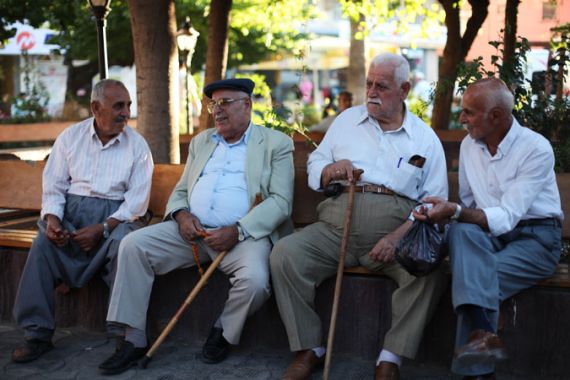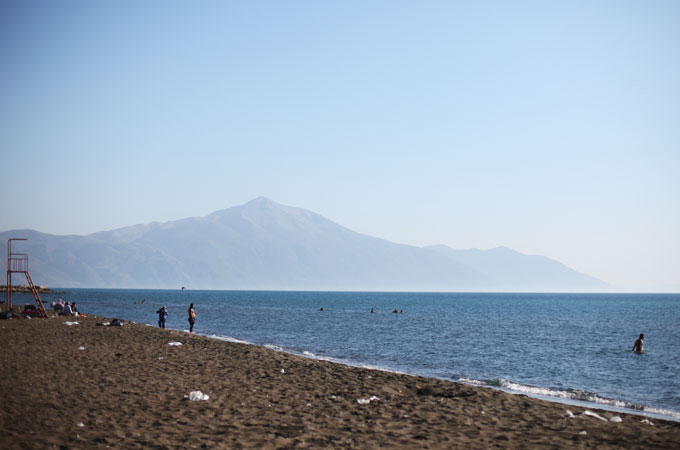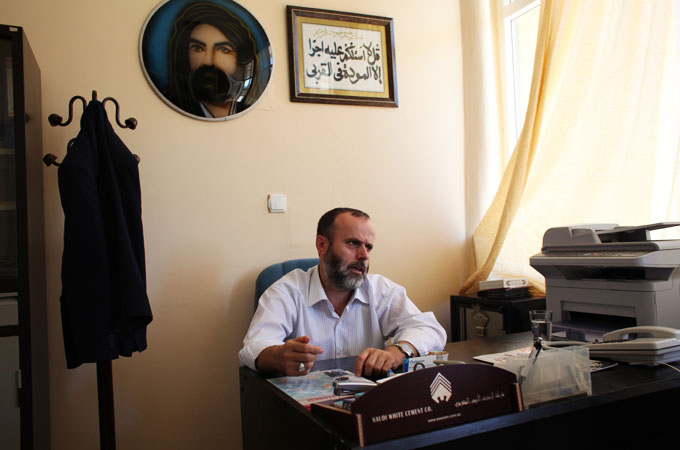Syria strife tests Turkish Alawites
Turkey’s small Alawite minority reacts warily as Ankara backs armed groups seeking to topple Syrian government.

Antakya, Turkey – The mountains melt away into the waters of the Mediterranean outside the Turkish-Alawite city of Samandag, nestled just beside the border with Syria.
Beyond the peaks is Latakia province, the ancestral homeland of the Assad family that has ruled Syria for more than four decades.
But on this side lies Hatay, Turkey’s southernmost province, which is home to most of the country’s Alawites. At around one million, they represent a small but vocal minority leading the opposition to the government’s role in the conflict in neighbouring Syria.
“When something is happening in Syria we feel it,” said 31-year-old Kemal sitting in a park in central Samandag. “We have Turkish citizenship, but our origins are Arab.”
He spoke in a Syrian dialect of Arabic, like most Turkish Alawites are able to. Although ethnically Arab, the community leaves little doubt about its strong patriotism for the modern Turkish state and its secular model of government.
When asked whether he felt more loyal to Syria or Turkey, Kemal presented his upturned forearms: “Cut open my veins and I assure you Turkish flags will pour out.”
Kemal, who declined to give his surname, was on a brief break from work as a barber in Saudi Arabia. Because of their common language, many Alawites from Turkey travel to the oil-rich Gulf for work.
Kemal says he hates living in what he described as Saudi Arabia’s ultra-conservative Muslim society. Most members of the Alawite faith, an offshoot of Shia Islam, are secular.
Opposing the opposition
 |
| Just beyond the mountains near Samandag is Syria [Matthew Cassel/Al Jazeera] |
But even more than living in Saudi Arabia, Kemal dislikes the country’s arming of opposition movements inside Syria. His criticism also extended to other Gulf and western governments he believes are partaking in a larger “American game” to exert further control over the Middle East.
As the effects of the Syrian conflict spill across its northern border into Hatay and other neighbouring provinces, Kemal’s views largely reflect those held by the larger Alawite community in Turkey.
The situation is even tenser 20 minutes down the road in Antakya, Hatay’s main city. Pointing to the Orontes river that runs through the city’s heart, a colleague said, “It flows north from Syria, just like the refugees.”
What began as a popular uprising against Syrian President Bashar al-Assad has since turned into a bloody conflict that has created a refugee crisis as large numbers of Syrians flee to neighbouring countries.
According to the United Nations’ refugee agency (UNHCR), almost 350,000 Syrian refugees have registered or are waiting to register with the organisation. Turkish authorities recently said more than 100,000 Syrians have sought refuge within its borders.
When the refugees first started arriving in mid-2011, Selim Matkap, an Alawite emergency room doctor and one of the heads of the union of medical workers in Hatay, said he and other Turkish human rights organisations tried to help by requesting permission to enter the refugee camps, which are all under tight control of the Turkish army.
“We wanted to go to the camps as associations from Hatay, because if people come here [in such circumstances] then we have responsibility to take care of them,” Matkap said.
For months he said that the groups repeatedly tried to gain access to the camps through the local government, with each refusal spawning more suspicion as to why the government seemed determined to keep them out.
Outrage
Soon after, residents of Hatay were outraged when the Free Syrian Army, the main umbrella organisation fighting against the Syrian government, on its website claimed its main base to be “Hatay, Turkey”. After complaints to Turkish officials, it was later changed to “Damascus, Syria”.
The Apaydin refugee camp near Antakya houses dozens of former Syrian army generals and hundreds of army defectors, and is the suspected location of FSA commander Riad al-Assad.
“The Turkish government is not supporting a democratic transition in Syria, it’s supporting armed groups,” Matkap said.
“We believe the Syrian regime is not democratic, but using weapons and the tactic of war is not a legitimate method to oppose it.”
“It’s the poor people who will suffer from this war, not the regime.”
As time progressed, Maktap and others began organising protests in Antakya against the government’s support for the armed opposition in Syria. He admitted that the overwhelming majority of the thousands of protesters were Alawites.
Matkap said Alawites have faced persecution since the time of Selim I, a 16th century Sultan of the Ottoman Empire, and today still feel marginalised in Turkish society.
|
“We are Turkish citizens and the owners of this land. We have to ask why we’re not getting support from our government.” – Selim Maktap, Alawite doctor |
When Hafez al-Assad, Bashar al-Assad’s father, took power in Syria in 1970, Maktap said Turkish Alawites began to feel more confident.
“It’s natural for Alawites in Hatay to think, ‘If something bad happens to me, then there is the Syrian government behind me’,” Matkap said.
After a number of large demonstrations in early September, the local governor banned all protests in Hatay as reports started to emerge of sectarian tensions between Alawites and Sunni Muslims in Antakya.
As the war in Syria drags on, fears have risen that the conflict has become increasingly sectarian, pitting Syria’s minority Alawites against the majority Sunni population.
But Ali Yeral, the head of an Alawite cultural organisation in Antakya, dismissed this characterisation.
“[Syria] doesn’t have a Sunni-Alawite problem,” he said, adding that he considers armed groups to be “terrorists” for taking up arms against the state.
“Like Turkey has the PKK [Kurdistan Workers’ Party], Ireland has the IRA [Irish Republican Army], Syria also has this problem.”
Yeral said that at first, he was excited upon hearing calls for more democracy in Syria.
Alarmed Alawites
But he said that Alawites became turned off from the uprising when videos showed Syrian protesters chanting not only against the regime, but also against Alawites more generally.
He also pointed to the sectarian rhetoric of exiled Syrian Sheikh Adnan al-Arour. The radical Sunni cleric, who hosts a popular satellite TV show in Saudi Arabia, infamously said that Alawites should be put through the meat grinder once the regime is toppled.
Syrian opposition activists in Hatay told Al Jazeera that these views do not represent the majority of their movement, which opposes sectarianism and sees the decision to take up arms as one of self-defence.
But as the battle for Syria continues with little end in sight, reports have increased of radical Islamist fighters, including many non-Syrians, taking part in the war.
 |
| Turkish Alawites like Ali Yeral oppose their government’s support for armed groups fighting in Syria [Matthew Cassel/Al Jazeera] |
Many people in Antakya, the main hub for foreigners travelling to opposition-held areas of northern Syria, say in recent months, they have seen a greater number of Arab and other Muslims who they suspect of being foreign fighters.
“Antakya is peaceful,” Yeral said. “But now we have foreign fighters turning up on the streets.”
Yeral feels that if any anti-Alawite backlash in Syria were to spill over into Turkey, it would not only include the relatively small Alawite community, but the much larger Turkish Alevi population believed to number some 20 million.
Because they share the same name in Turkish (Alevi), Arab Alawites and Turkish Alevis are often thought to be the same religion, despite the fact that members of the respective faiths observe different religious practices and beliefs.
However, they both consider themselves followers of Ali, the prophet’s relative, from whom their name derives, setting them apart from Turkey’s Sunni-dominated ruling Justice and Development Party (AKP).
But while Turkish Alevis are spread throughout the country and harder to define as a coherent political group, Alawites are mostly concentrated in Hatay, a region with its own unique history.
‘Betrayed’
After the Ottoman Empire collapsed during WWI, France, then in control of Syria, helped Turkey gain control over Hatay in the 1930s. The region had been considered part of Syria, but France was eager to win Turkey over to the allies’ side in WWII.
Furious by what they felt was the theft of much of their Arab territory, many Alawites and other Arabs left the area for Syria.
The Alawites who stayed behind became part of the Turkish state, founded on the strong secularism of Kemal Ataturk, its first president, whose ideology they still subscribe to.
But today, Alawites in Turkey feel betrayed by a government they say is acting against their interests by supporting armed groups.
“We are Turkish citizens and the owners of this land, we have to ask why we’re not getting support from our government [like the Syrian opposition is],” Maktap said.
“Instead we see rebels firing bullets at the government that has supported us.”
When asked what would happen to Turkish Alawites if the Assad regime in Syria falls, Matkap replied, “It’s going to be difficult.
“We never really felt we belonged to this state. It will be the same way if the regime goes.”
Follow Matthew Cassel on Twitter: @justimage